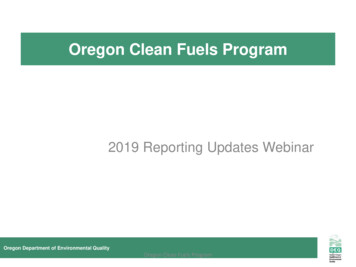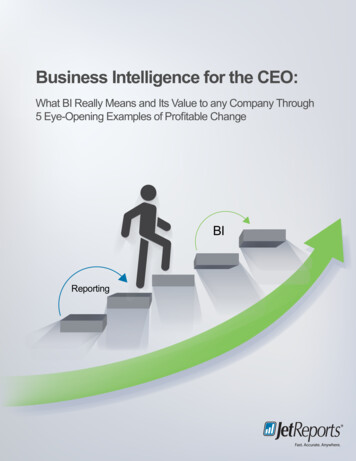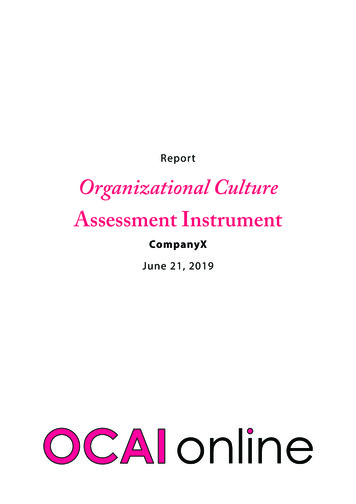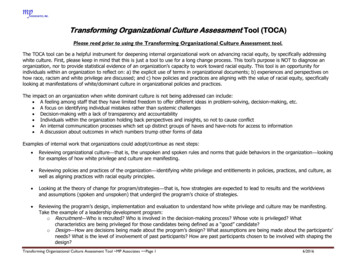
Transcription
An IDC Thought Leadership White Paper, sponsored by TableauHow Data Culture FuelsBusiness Value inData-Driven OrganizationsRESEARCH BY:Chandana GopalResearch Director,Future of Intelligence, IDCMay 2021 IDC Doc. #US47605621
How Data Culture Fuels Business Value in Data-Driven OrganizationsNavigating this White PaperClick on titles or page numbers to navigate to each section.Methodology . . . . . . . . . . . . . . . . . . . . . . . . . . . . . . . . . . . . . . . . . . . . . . . . . . . . . . . . . . . . . . . . . . . . . . . . 3Situation Overview . . . . . . . . . . . . . . . . . . . . . . . . . . . . . . . . . . . . . . . . . . . . . . . . . . . . . . . . . . . . . . . . . 4 Data Culture Plays a Large Role in Becoming a Data-Driven Organization . . . . . . . . . 5 Key Trends in Organizations with Strong Data Cultures. . . . . . . . . . . . . . . . . . . . . . . . . . . . 8 1. D ata-Driven Organizations Establish High Talent Expectationsfor a Wide Spectrum of Data-Related Activities . . . . . . . . . . . . . . . . . . . . . . . . . . . . . . . . . . . . . . 8 2. Data-Driven Organizations Place Equal Importance on Trust and Accountability. . . . . . . . . . 3. Data-Driven Organizations Encourage Data Exploration and Curiosity . . . . . . . . . . . . . . . . . 4. Data-Driven Organizations Break Down Silos and Emphasize Collaboration . . . . . . . . . . . .91112 5. Data-Driven Organizations Are Committed to Realizing Value From Data. . . . . . . . . . . . . . . 14Future Outlook . . . . . . . . . . . . . . . . . . . . . . . . . . . . . . . . . . . . . . . . . . . . . . . . . . . . . . . . . . . . . . . . . . . . .17Identify Gaps in Your Data Culture. . . . . . . . . . . . . . . . . . . . . . . . . . . . . . . . . . . . . . . . . . . . . . . . .17Benefit from Incremental Investments in Data Culture. . . . . . . . . . . . . . . . . . . . . . . . . . . . .17Make Simple Changes to Mindset . . . . . . . . . . . . . . . . . . . . . . . . . . . . . . . . . . . . . . . . . . . . . . . .17Executives Have a Big Impact. . . . . . . . . . . . . . . . . . . . . . . . . . . . . . . . . . . . . . . . . . . . . . . . . . . . . .17Look for New Metrics to Measure Improvement . . . . . . . . . . . . . . . . . . . . . . . . . . . . . . . . . .18Conclusion . . . . . . . . . . . . . . . . . . . . . . . . . . . . . . . . . . . . . . . . . . . . . . . . . . . . . . . . . . . . . . . . . . . . . . . . . 18About the Analyst. . . . . . . . . . . . . . . . . . . . . . . . . . . . . . . . . . . . . . . . . . . . . . . . . . . . . . . . . . . . . . . . . 19Message from the Sponsor . . . . . . . . . . . . . . . . . . . . . . . . . . . . . . . . . . . . . . . . . . . . . . . . . . . . . . 20IDC Thought Leadership White Paper, sponsored by TableauMay 2021 Doc. #US476056212
How Data Culture Fuels Business Value in Data-Driven OrganizationsMethodologyIDC conducted a global survey of 1,100 respondents who use data within their organizations.They comprised a mix of executive and managerial positions and were people with technical andnon-technical roles. Survey participants were from organizations with 500 employees and werelocated in ten countries: Brazil, Canada, China, France, Germany, India, Japan, Mexico, UnitedKingdom, and the United States. Respondents represented several industries including financialservices, manufacturing, healthcare, professional services/technology, utilities, retail/wholesale,and government/education.IDC asked survey participants questions that would help identify key explicit and implicitcharacteristics that influence how data is used in decision making. The survey collected attitudinaland behavioral measures of these characteristics. The analysis of the data helped build a scale tomeasure the presence and depth of key drivers and an overall measure of Data Culture.IDC first partnered with Tableau to assess the impact of Data Culture on business outcomes.In this piece, we explore trends at the regional and industry levels. Respondents were classified intoone of four groups based on the maturity of their Data Culture. Roughly one quarter of respondentsfell into each of the groups as shown in Figure 1.FIGURE 1Data Culture MaturityData-aware 25%Data-adopting 25%Data-mature 25%Data-leading 25%Very early stagesin the DataCulture journeySome DataCulture initiatives;adoption in partsof organizationTool adoption,training, and leverageof data in mostdepartmentsLeading-edgeorganizations withstrong enterprise-wideData CultureHighest Data Culture ScoreLowest Data Culture 1.1%Transportation,Commercial, on0%25%14.8%50%Percentage of organizations75%100%n 1,100, Source: IDC, 2021IDC Thought Leadership White Paper, sponsored by TableauMay 2021 Doc. #US47605621Table of Contents3
How Data Culture Fuels Business Value in Data-Driven OrganizationsSituation OverviewThere is no question that data and analytics form the backbone of digital transformation efforts.Data on its own is meaningless. It has to be made available in the right form, in the right time,and with the necessary context to drive business outcomes.As businesses adopt data and analytics technologies to become more data-driven, they runinto challenges — not for a lack of data or necessary tools but for a lack of data-driven behaviorsand beliefs that surround data usage. To truly transform and leverage data and analyticstechnology investments, organizations need to focus on their people and build a culture thatprioritizes data in decision making — also known as Data Culture.Organizations that pair the right investments in technology with a focus on Data Culture lead themarket in being able to take advantage of opportunities, drive growth, foster innovation, anddifferentiate themselves from their peers.But in order to foster a Data Culture, there has to be a concerted effort to take an honest lookat the pervasive use of data across the entire organization, identify gaps and inhibitions aroundthe use of data, then implement a strategy that addresses the gaps. An organization’s executivesoften mandate that they want to be more data-driven and intelligent, but Figure 2 shows thedifference between the “wants” and “haves” in reality.FIGURE 2Gap Between Wants and Haves Around DataWhat they want83% of CEOs want their organizations to be more data-drivenExecutives87% of CXOs said being an intelligent enterprise is their top priorityManagersWhat they have33% are comfortable questioning KPIs and metrics used in organizations29% are asked to communicate using data-driven methodsFrontlineWorkers30% say actions are driven by data analysis34% find it easy to find internal or external collaborator that can helpn 455, Base end users, Source: IDC survey, 2021IDC Thought Leadership White Paper, sponsored by TableauMay 2021 Doc. #US47605621Table of Contents4
How Data Culture Fuels Business Value in Data-Driven OrganizationsData Culture Plays a Large Role in Becominga Data-Driven OrganizationAccording to IDC survey research, organizations with strong Data Cultures were more likelythan their peers to be data-driven, using data in three distinct ways:1. Integrated into Daily Meetings and DiscussionsIncorporating data into daily practice is critical to fostering a Data Culture; this includesmeetings, presentations, and discussions. When asked about the frequency of datausage across all meetings, data-leading organizations were 10 times more likely to saydata was “always” rather than “sometimes” present (Figure 3).FIGURE 3Percentage of Organizations that Always Require Data in ance40%100%Healthcare31%81%Government /Education41%72%Retail/WholesaleIndustriesAll organizationsTransportation,Commercial, 5%Percentage of organizationsAlwaysOftenSometimesPercentage of organizationsNot very muchNot at allNot suren 1,100, Source: IDC, 2021IDC Thought Leadership White Paper, sponsored by TableauMay 2021 Doc. #US47605621Table of Contents5
How Data Culture Fuels Business Value in Data-Driven Organizations2. When Recommending Next Steps or ActionsDuring normal business operations, employees often prepare recommendations for nextsteps or actions. When asked about whether data was required to support recommendations,opinions, or decisions, data-leading respondents were six times more likely to say that datawas “always” rather than “sometimes” required (Figure 4).FIGURE 4Percentage of Organizations that Always Require Data to Support ermany28%62%49%90%Oil/Gas39%88%OtherIndustriesAll %Government ansportation,Commercial, entage of organizationsAlwaysOftenSometimesPercentage of organizationsNot very muchNot at allNot suren 1,100, Source: IDC, 2021IDC Thought Leadership White Paper, sponsored by TableauMay 2021 Doc. #US47605621Table of Contents6
How Data Culture Fuels Business Value in Data-Driven Organizations3. To Support Major DecisionsWhen asked to reflect on major business decisions made in the previous month, data-leadingrespondents were 4.5 times more likely to say the decision was influenced by data, eitherdisplayed in presentations or as a means to aid in substantial discussion (Figure 5).FIGURE 5Percentage of Organizations that Always Require Data to Support Major 16%46%Brazil24%43%FranceCountriesAll any6%22%11%9%23%23%13%Japan %13%Transportation,Commercial, Utilities33%12%Oil/Gas33%Government /EducationHealthcare16%31%9%27%10%75%75%Percentage of organizationsAlwaysOftenSometimesPercentage of organizationsNot very muchn 1,100, Source: IDC, 2021IDC Thought Leadership White Paper, sponsored by TableauMay 2021 Doc. #US47605621Table of Contents7
How Data Culture Fuels Business Value in Data-Driven OrganizationsKey Trends in Organizations withStrong Data CulturesThe definition of culture is a set of shared attributes, values, goals, and practicesthat characterizes an institution or an organization. As an extension to that,Data Culture encompasses the values, behaviors, and attitudes of executivesand employees around data used in decision making.The attributes of Data Culture range from visible characteristics like training methods, toolsavailable, and business processes to more subtle and hard-to-quantify characteristics such asempathy, identity, and confidence in data skills.In measuring 17 characteristics, we identified five trends in behaviors and beliefs among allof the respondents who fell into the category of data-leading organizations. While there wassome localization of these trends at the country level, they were generally held at a globallevel as well. Overall, we found Brazil and India to have the most optimistic responses, relativeto other countries, with Japan, Canada, France, Germany, and the UK responses skewingcomparatively pessimistic.1. Data-Driven Organizations Establish High Talent Expectations for a WideSpectrum of Data-Related ActivitiesBeing data-driven requires a variety of skills such as being able to find and connectwith data, being able to analyze data, being able to interpret data, being able totell stories with data, and using data in decision making. When enterprises recruit peoplewith the skills above and invest in upskilling their employees, they begin to see theentire organization become more data-driven.Globally, data-leading companies were three times more likelythan data-aware organizations to require new hires to know howto persuasively present data when arguing a point.Asia/PacificIn this region, data-aware companies lagged data-leading companies by 45% in the abilityof their employees to analyze data. Respondents in China and Japan struggled in thisarea, performing below average. Companies in India performed above average, receivinga positive grade on their data-literacy investments. Globally, only 3% of organizationssaid they did not have any data-skills training for employees; of these organizations,however, a third were located in Japan, comprising 11% of the responses from that country.IDC Thought Leadership White Paper, sponsored by TableauMay 2021 Doc. #US47605621Table of Contents8
How Data Culture Fuels Business Value in Data-Driven OrganizationsLatin AmericaAcross all countries surveyed, organizations in Mexico reported the greatest successesfrom data-literacy investments. Both Mexico and Brazil showed above-average scores forthe ability to analyze, interpret, and use insights from data. These investments have paidoff: In Latin America, respondents in data-leading companies were seven times betterat finding and connecting to data than respondents in data-aware companies.North AmericaThe United States was the country most likely to say that data-related training wasmandatory for employees, with a quarter of organizations setting the mandatory expectationfor all employees. This was largely driven by 37% of data-leading organizations requiringdata-skills training for all employees. Comparatively, Canada was less inclined tomake training mandatory, even in organizations with a strong Data Culture. While 13% ofall respondents said training was required for all employees, only 16% of data-leadingorganizations set the mandatory expectation.Western EuropeWestern European companies showed consistently low scores, revealing below-averageinvestments in upskilling employees. While France and the United Kingdom performedslightly behind the global average (by 3 and 4 percentage points, respectively), Germanywas 14 percentage points behind. When asked if they agreed with the statement “We havethe right people with the right skills to answer our most important business questionswith supporting data and analysis,” nearly a quarter of German respondents did not agree. 2. Data-Driven Organizations Place Equal Importance on Trust and AccountabilityTrust is the foundation for creating a strong culture around accessing and using data. Trustis required for enterprises to give their employees access to data that is relevant to theirjobs, and employees need to trust the data that they’re using. Enterprises need to have allthe right policies and the governance in place to ensure that employees can responsiblyuse data but also remove all friction in allowing employees to access relevant data.Data-leading organizations give their employees full transparency with the use of data andbreak down all boundaries that exist between departments, business units, geographies,etc. In turn, employees in data-leading organizations feel more accountable for the datathey can access and feel personally responsible for that data. Data-leading organizationsmake it easier for employees to get access to all of the data they need to do their jobs.IDC Thought Leadership White Paper, sponsored by TableauMay 2021 Doc. #US47605621Table of Contents9
How Data Culture Fuels Business Value in Data-Driven OrganizationsTrust tends to be heavily influenced by regional culture. Employees oforganizations in the Asia/Pacific and Western Europe regions weremost likely to cite that their organizations provided visibility to datawithin a group or a department.Asia/PacificOrganizations in Asia/Pacific demonstrated a high degree of trust toward theircolleagues and their organization but a lower level of confidence in people’s dataskills. This drives governance models that are highly restrictive and inhibit access todata. Data-aware organizations in India said they felt less accountable for the data in theirorganization despite 31% of respondents having access to all company data. In Japan,one third of organizations give access to department-level data, but only one respondentreported that their employees have access to company-wide data. Respondents in Chinareported that most employees did not have access to data outside of their department.Latin AmericaThe lowest scores regarding trust and accountability are found in Latin America.In Mexico, only 11% of respondents said they have visibility into company-wide data,and Mexican organizations gave the third-lowest trust scores of all respondents.Brazil had the lowest rating of all respondents’ countries. Similar to respondents in theAsia/Pacific region, a connection can be made between this low level of trust and a lackof personal accountability for how data is used. On the whole, Latin America (followedclosely by Asia/Pacific) has the greatest opportunity to benefit from establishing guidelinesaround data use and building a sense of accountability around data.North AmericaThe United States and Canada had the highest scores for this trend, with both countriesperforming above average and consistent performance between countries. In data-leadingorganizations in North America, 70% more respondents said that stakeholders madeit easy to access the data they need to do their jobs than in data-aware organizations.This was stronger than in any other region and may largely be owed to earlier and deeperexposure to self-service models of business intelligence that require a balance betweenempowerment and control to be successful.Western EuropeEmployees of organizations in Western Europe (as well as in Asia/Pacific) cited that theirorganizations were most likely to provide visibility to data within a group or a department.While all respondents in the United Kingdom, France, and Germany rated theirorganizations above average in trust and accountability, the highest ratings camefrom companies in France.IDC Thought Leadership White Paper, sponsored by TableauMay 2021 Doc. #US47605621Table of Contents10
How Data Culture Fuels Business Value in Data-Driven Organizations3. Data-Driven Organizations Encourage Data Exploration and CuriosityHaving tools, technology, and access to data doesn’t directly lead to an organizationbecoming more data-driven. People have to have a data-oriented mindset. Employees ofdata-leading organizations have a work identity that is rooted in data and are open toexperimenting with data. In many interactions with people in organizations with a strongData Culture, employees often cite that their executives would rather actively encourageexperimentation using data and experience failure than take the easier path of notbeing data-driven.Organizations with a strong Data Culture allow their employees to experiment, fail, explore,and innovate using data. They expect their employees to bring data to meetings and makedecisions based on data instead of on intuition or guesswork. The use of data becomespart of the organization’s DNA; its employees take pride in being data-savvy and data isa core part of the organization’s goals and priorities.On average, 73.5% of respondents in data-leading companies acrossall geographies said that their decision making was always data-driven,compared with just 5.7% in data-aware organizations.Asia/PacificWithin the region, there was slight variation across respondents’ countries. Participants inChina expressed the lowest satisfaction within the region with how their organizationsuse, innovate, and explore with data. Companies in Japan had slightly above-averagescores for encouraging data exploration and curiosity, which may be due in partto the data mindset in the manufacturing industry: 32% of respondents prioritize kaizenand other lean manufacturing techniques. In India, where 22% of respondents werefrom the service/technology sector, higher ratings may be related to the tendency toprioritize innovation.IDC Thought Leadership White Paper, sponsored by TableauMay 2021 Doc. #US47605621Table of Contents11
How Data Culture Fuels Business Value in Data-Driven OrganizationsLatin AmericaOf the five trends outlined in this white paper, Latin America performed the strongest ona data-oriented mindset, contributing to 30% of the region’s Data Culture index score. In theregion, 83% of respondents said either that data was a “core part of their work identity”or that they were professionally “quite strongly data-driven.” This number was drivenin part by data-minded industries. Of Mexico’s respondents, 19% were in the servicesindustry and 19% in manufacturing (specifically, 15% from process manufacturing), while 38%of Brazil’s respondents were from the service/technology sector and 14% from finance.North AmericaNorth America received comparatively average scores for its data-driven approach to work.When it comes to mindset, there may be value in considering the influence of industrynorms and the respective distribution of industries across respondents’ countries.Respondents from Canada pulled heavily from the finance and government/educationsectors, where globally only 13.2% and 10.3% of respective respondents said data wasa “core part of my work identity.” U.S. respondents saw a prominence of responsesfrom the service/technology sector, where globally 24.1% agreed with the above statementand 27% were categorized as data-leading. These figures can be compared with otherglobal industries: oil/gas (24.2%), retail/wholesale (18.5%), manufacturing (17.7%), other (17.1%),transportation/communication/utilities (16.8%), and healthcare (12.5%).Western EuropeAcross Germany, France, and the United Kingdom, there was the greatest regional variationin scores around openness and encouragement of data exploration. Respondents inthe United Kingdom, the most widely distributed country with five sectors accountingfor 76% of respondents, reported the strongest encouragement to experiment withdata. The average across Germany was in line with the global response, as responsespulled nearly equally from the manufacturing (20%) and finance (18%) sectors — high andlow tendencies toward a data mindset may have been offset. France gave the lowestscores across all countries surveyed, pulled down in part by 9% of respondents being fromthe utilities industry in a country largely dominated by unions.4. Data-Driven Organizations Break Down Silos and Emphasize CollaborationHumans are inherently social beings, and interactions enrich our daily lives. Similarly, in thecontext of Data Culture, organizations in which people communicate and collaborate withdata perform better. People share ideas and best practices and build empathy aroundusing data. Employees in data-leading organizations openly give and receive help, not onlywithin teams but across groups and business units. These organizations are most successfulin breaking down silos and creating environments in which everyone is willing and able toshare insights and analytics.IDC Thought Leadership White Paper, sponsored by TableauMay 2021 Doc. #US47605621Table of Contents12
How Data Culture Fuels Business Value in Data-Driven OrganizationsAsia/PacificNearly all participating organizations from India, 92% of respondents, said they heldin-person conferences on the topics of data or analytics — up slightly from the 87%of respondents in India who hosted employee conferences virtually. In China, it is alsostandard practice to host internal data conferences, with 93% of organizations havinghosted them in person and only 71% hosting virtually. There is less engagement withcommunity-building programs in Japan: 65% of respondents had in-person conferences,while 51% held virtual conferences and 54% held virtual user groups.Latin AmericaGlobally, there is optimism that colleagues will assist other colleagues with data-relatedquestions: 85% of organizations said they were confident or extremely confident that theycould rely on colleagues to answer data-related questions. Latin America was even moreoptimistic, with 98% of respondents from Brazil and 94% of respondents in Mexicoexpressing this same degree of confidence. (Nearly half of Brazil’s respondents,48% of them, were extremely confident they could rely on colleagues.) In Latin America,this informal network of support is supplemented with a focus on company-run analyticsoffice-hours programs: 89% of Latin American organizations provide this service totheir employees.North AmericaIn recent years there has been a focus on creating community-building programs arounddata and analytics. North America was largely in line with the global pattern thatorganizations with strong Data Cultures made investments in five or more communitybuilding activities — while organizations that hadn’t yet transformed their Data Cultureswere supporting two or fewer. In the United States, there was a preference for internalforums on the topic of data or analytics, while Canada preferred user groups or communitypractice sessions.Western EuropeIn Western Europe, 82% of respondents in data-leading companies were extremelyconfident that they could get help from their colleagues, compared with only 13% indata-adopting companies. This is due in part to a heavy emphasis on data and analyticshelp desk and office-hours programs. In both France and Germany, there was moresupport for these types of programs than any other community-enablement program.Additionally, in the United Kingdom, three quarters of respondents regularly held usergroup or community practice sessions on an ongoing basis.IDC Thought Leadership White Paper, sponsored by TableauMay 2021 Doc. #US47605621Table of Contents13
How Data Culture Fuels Business Value in Data-Driven Organizations5. Data-Driven Organizations Are Committed to Realizing Value from DataAs stated in the IDC InfoBrief, we found an incremental correlation between organizations’placement within the Data Culture index and their performance on a set of standardbusiness metrics (Figure 6).FIGURE 6Percentage of organizations seeing improvementData Culture Provides Rich Dividends4540353025201510Data-awareCustomer metric (satisfaction)Data-adoptingOffering metric (time to market)Data-matureEmployee metric (productivity)Data-leadingFinancial metric (profit)n 1,100, Source: IDC, 2021Most organizations want to be more data-driven in their decision making, but the ones thatsucceed are those in which leaders commit to making the investments they need to realizetheir goals. These commitments span the gamut of people, processes, and technologythat is required for deploying and adopting data and analytics at scale.One of the most powerful influencers of Data Culture is executive leadership. Organizationsthat are led by executives who understand the importance of data and who use datathemselves in their day-to-day activities are able to accelerate their path toward becomingdata leaders. This level of commitment is critical to creating a strong Data Culture withinan organization.IDC Thought Leadership White Paper, sponsored by TableauMay 2021 Doc. #US47605621Table of Contents14
How Data Culture Fuels Business Value in Data-Driven OrganizationsOn average, across geographies, there was a 46.2% difference betweendata-leading and data-aware organizations with respect to treating dataas an asset and recognizing the value it delivered.Executives in data-leading companies are eight times more likelyto actively use data themselves in their work compared withdata-aware companies.For countries with lower than average scores regarding data investments,low data literacy scores can generally be observed, demonstratingan analogous relationship between investments to realizing the valueof data and data literacy.Asia/PacificThis region reported greater variation across participating countries. Respondents fromChina were more likely than any other country to have a chief data officer or a chiefanalytics officer (CDO/CAO), with 57% — 14 percentage points higher than any othercountry. Of India’s respondents, 38% had a CDO or CAO, but 18% of respondents said thata senior manager was responsible for the organization’s data strategy. This was secondonly to Japan, with 28% of respondents reporting a similar structure. Furthermore, Japanwas the only country to have a sizable number of organizations say there was a lackof data leadership — over a tenth of organizations indicated there was no clear personresponsible for data. It is, therefore, not surprising that 30% of Japanese respondents saidthey were “unsure of their data’s value,” which is by far the most of any country surveyed.Latin AmericaIn Brazil, 40% of respondents identified someone in the C-suite as the senior-mostperson responsible for analytics, compared with 44% of Mexico’s respondents.Interestingly, organizations in Mexico were as likely to have their senior analytics leaderreport to the COO as to the CEO — a behavior seen in one other
IDC first partnered with Tableau to assess the impact of Data Culture on business outcomes. In this piece, we explore trends at the regional and industry levels. Respondents were classified into one of four groups based on the maturity of their Data Culture. Roughly one quarter of respo










